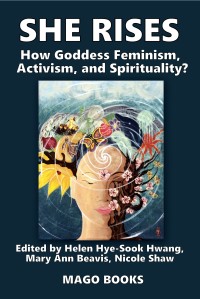(She Rises Volume 2 Live Now. See and order here.)
She Rises Vol 2: How Goddess Feminism, Activism, and Spirituality? explores how Goddess-based spirituality, which is sometimes termed as women’s spirituality, is expressed and actualized in the lives of contemporary women from around the world. The book is a body of writings with creative imagery by 96 authors which is contextualized within a Magoist Cosmology and Mago Work. According to co-editor, Dr Helen Hye-Sook Hwang, Mago Work “advocates feminist and spirituality-based activism, promotes creative and sound research, supports awareness of oneness of all entities in the universe across differences of sex, culture, race, ethnicity, class, ability and species, and seeks to create a world that is non-ethnocentric, non-racist, non-capitalist, non-imperialist and counter-patriarchal”. The notion of Mago Work derives from the Korean Goddess Mago who Hwang describes as “the ancestor of all races. She takes care of everything on earth via the equilibrium of cosmic music/sound/vibration”. This perception is evident in the structure of the book which skillfully and harmoniously brings together outlooks and practices from women of different cultural backgrounds and racial origins.
The book is, on one hand, a colourful and inspirational journey into an experience of the Goddess in her various manifestations. There are authentic stories of healing, revelations and restored hope via the Goddess that may provide the reader with a sense of solace, belonging, and feminine empowerment. On the other hand, students and scholars of traditional and new religions, contemporary spiritualities and feminist spirituality can find in this book various examples of Goddess-led practices and the worldviews that inform them. Many of the authors in this book demonstrate immanent and embodied modes of spirituality that have had a profound impact on contemporary spiritualities and holistic and ecological cultural trends especially during the second half of the 20th century and up to this day and age.
In terms of how the Goddess as a spiritual and mythic framework is actualized in daily life and the world’s dynamics, the writings seem to unfold two main passages: The first passage, which pertains to the majority of the writings, utilizes the Goddess as a path for personal healing and collective feminine encouragement. This passage is often poetic, intuitive and involves a journey within the body and psyche. It has a cosmic, nature and mythic dimensions and includes a communion with other women whilst there is a retreat from worldly affairs. As Lucy H. Pearce writes in her article “Going Dark: The Source of Sustainable Feminine Power”: “We cannot find the answers outside. We cannot connect fully to this power through doing. We can only find it in the darkness. […] Sit in circle with other women. Sit in nature by ourselves. And listen.”
The second passage outlines an external trajectory that seeks to operate within the mainstream of culture and affects it directly. Several authors provide references to their academic research and PhD dissertations on aspects of women’s lives, feminine psychology, feminist critique, mythology, the arts and more, e.g., Nané Jordan’s “Spiral Movements”, Ayele Kumari’s, “Iyami and the Female Roots of Power in the Ifa Orisha Tradition”, Glenys Livingstone’s “Celebrating Her/My/Our Everyday Sacred Journey Around the Sun”, and others.
It becomes apparent that women are gradually changing cultural stereotypes and pave the way to other women through their strong presence in academia, online publishing platforms, e.g., The Girl God, and other professions despite the many limitations. At the present time where activism is very rarely associated with the Goddess, Harita Meennee, in her article ‘The Revolution Remembered, Activism as a Sacred Path’, recalls the Goddess Isis’ compassionate mythic act of remembering Osiris. Meennee explains how the Goddess’ action is seen not only as a metaphor but as an ideological standpoint of the revolution as evolution. Looking forward, in “The Futuristic Woman: Letter of Letters Manifesto”, Dr Lila Moore pays homage to groundbreaking female artists and manifesto writers who evolved novel art forms. She highlights the evolving archetype of the futuristic woman who brings old and new knowledge to counteract the dominant narrative of violence.
She Rises offers a rich resource for those who seek spiritual and emotional Goddessians’/Magoists’ uplift and for those who would like to learn or research this field of feminist, activist and goddess spirituality.
Dr Lila Moore (founder of the Cybernetic Futures Inst., a networked platform and online academy for the study of Technoetic Arts, Consciousness and the Spiritual in Art)

